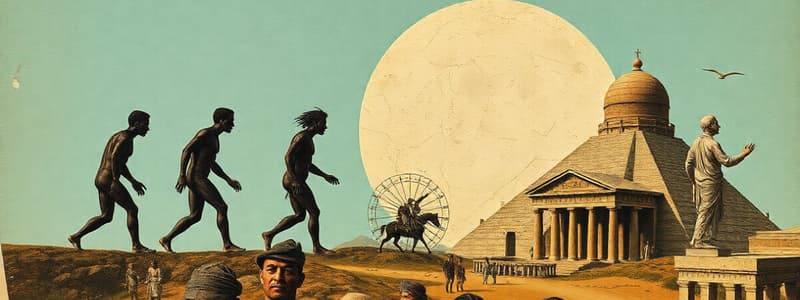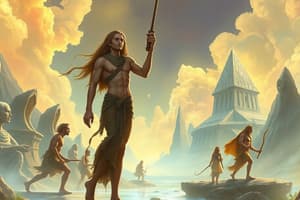Podcast
Questions and Answers
Which innovation from the early exploration era MOST directly facilitated long-distance sea travel?
Which innovation from the early exploration era MOST directly facilitated long-distance sea travel?
- The printing press
- The telegraph
- The steam engine
- The compass and caravel (correct)
Which factor was not a significant early development in human evolution?
Which factor was not a significant early development in human evolution?
- Emergence of complex language
- Widespread adoption of agriculture (correct)
- Development of bipedalism
- Creation of tools
Which of the following was a consequence of European colonization during the Age of Exploration?
Which of the following was a consequence of European colonization during the Age of Exploration?
- Increased equality among nations and people
- The flourishing of indigenous industries
- The decline of European influence
- The transatlantic slave trade and European domination (correct)
Which group of ancient civilizations all developed complex writing systems?
Which group of ancient civilizations all developed complex writing systems?
What was the MOST significant emphasis of the Enlightenment, shaping subsequent revolutions and societal reforms?
What was the MOST significant emphasis of the Enlightenment, shaping subsequent revolutions and societal reforms?
Which of the following revolutions was directly influenced by Enlightenment philosophical ideas?
Which of the following revolutions was directly influenced by Enlightenment philosophical ideas?
What was a unique aspect of the political structure in ancient Greece?
What was a unique aspect of the political structure in ancient Greece?
The Industrial Revolution is associated with which major societal transformation?
The Industrial Revolution is associated with which major societal transformation?
Which of the following was not a key feature of the European Middle Ages?
Which of the following was not a key feature of the European Middle Ages?
What was the primary intellectual focus of the Renaissance?
What was the primary intellectual focus of the Renaissance?
Which development is most closely linked to increased mechanization and industrial growth during the Industrial Revolution?
Which development is most closely linked to increased mechanization and industrial growth during the Industrial Revolution?
What was the central issue that triggered the Reformation?
What was the central issue that triggered the Reformation?
Which historical development was MOST influential in shaping the political landscape of the 20th and 21st centuries?
Which historical development was MOST influential in shaping the political landscape of the 20th and 21st centuries?
Which technological innovation from the 20th century significantly changed humanity's perception of possibilities and limitations?
Which technological innovation from the 20th century significantly changed humanity's perception of possibilities and limitations?
What major event was most directly linked to Martin Luther's Ninety-Five Theses?
What major event was most directly linked to Martin Luther's Ninety-Five Theses?
Which historical perspective is MOST valuable when understanding world history comprehensively?
Which historical perspective is MOST valuable when understanding world history comprehensively?
Which long-term outcome resulted from the European Age of Exploration during the 15th and 16th centuries?
Which long-term outcome resulted from the European Age of Exploration during the 15th and 16th centuries?
What does the analysis of global trade routes and cultural exchanges MOST significantly bring to the study of different eras?
What does the analysis of global trade routes and cultural exchanges MOST significantly bring to the study of different eras?
How did new technologies during ancient times affect the development of civilizations?
How did new technologies during ancient times affect the development of civilizations?
Which of the following best characterizes the transition from the Middle Ages to the Renaissance?
Which of the following best characterizes the transition from the Middle Ages to the Renaissance?
Flashcards
Bipedalism
Bipedalism
The ability to walk upright on two legs, a defining characteristic of hominins that allowed for greater mobility and tool use.
Human Evolution
Human Evolution
The process of human evolution, spanning millions of years from early hominins to modern humans.
Ancient Civilizations
Ancient Civilizations
Ancient civilizations that emerged across the globe, characterized by complex organizations, agriculture, and writing systems.
Greek Democracy
Greek Democracy
Signup and view all the flashcards
Roman Law
Roman Law
Signup and view all the flashcards
Medieval Period
Medieval Period
Signup and view all the flashcards
Renaissance
Renaissance
Signup and view all the flashcards
Reformation
Reformation
Signup and view all the flashcards
Age of Exploration
Age of Exploration
Signup and view all the flashcards
Columbian Exchange
Columbian Exchange
Signup and view all the flashcards
Enlightenment
Enlightenment
Signup and view all the flashcards
Transatlantic Slave Trade
Transatlantic Slave Trade
Signup and view all the flashcards
Industrial Revolution
Industrial Revolution
Signup and view all the flashcards
Urbanization during Industrial Revolution
Urbanization during Industrial Revolution
Signup and view all the flashcards
Imperialism
Imperialism
Signup and view all the flashcards
Major Events of the 20th Century
Major Events of the 20th Century
Signup and view all the flashcards
Nuclear Weapons and Space Exploration
Nuclear Weapons and Space Exploration
Signup and view all the flashcards
Globalization
Globalization
Signup and view all the flashcards
Global History: Interconnected Events
Global History: Interconnected Events
Signup and view all the flashcards
Comparative Methodology in History
Comparative Methodology in History
Signup and view all the flashcards
Study Notes
Early Human History
- Human evolution encompasses millions of years, from early hominins to modern humans.
- Key evolutionary milestones include bipedalism, tool development, and language emergence.
- Fossils and artifacts offer invaluable insights into past human societies.
Ancient Civilizations
- Global ancient civilizations include Mesopotamia, Egypt, Indus Valley, and China.
- These civilizations established complex governance, sophisticated agriculture, and sophisticated writing systems.
- Advancements like irrigation, writing, and monumental architecture defined their progress.
- Cultural accomplishments span art, literature, and religion.
Classical Antiquity
- Ancient Greece and Rome formed the foundation of Western civilization, impacting philosophy, politics, and law.
- Greek democracy and Roman legal systems had wide-reaching consequences.
- Philosophical traditions from Greek thinkers like Socrates, Plato, and Aristotle continue today.
- Roman engineering, administration, and law profoundly influenced subsequent societies.
Medieval Period
- The Middle Ages (5th to 15th centuries) saw feudalism, Christianity's rise, and the Crusades in Europe.
- Key events also included the Black Death, university development, and societal transitions from rural to urban areas.
- Strong monarchies and new trade routes shaped European history significantly.
Renaissance and Reformation
- The Renaissance, a period of artistic and intellectual renewal, emphasized humanism and classical learning.
- Scientific advancements and discoveries altered the understanding of the world and spurred artistic and scientific growth.
- The Protestant Reformation challenged the Catholic Church, causing religious conflict and divisions across Europe.
- Martin Luther's Ninety-Five Theses ignited this significant religious movement.
The Age of Exploration
- European exploration and colonization profoundly impacted the world in the 15th and 16th centuries.
- Voyages of discovery led to cultural exchange and the movement of resources, ideas, and people across continents.
- Technological advances like the compass and caravel facilitated explorations.
- Colonization's consequences included the transatlantic slave trade and European domination.
The Enlightenment and Revolution
- The Enlightenment emphasized reason, individual rights, and scientific inquiry.
- Enlightenment thinkers challenged traditional authority, advocating for societal and governmental reforms.
- Revolutions in the Americas and France challenged existing political structures.
- Enlightenment philosophy influenced worldwide social and political changes.
Industrial Revolution and Modernity
- The Industrial Revolution, starting in the 18th century, brought forth significant technological advancements.
- Mechanization, factories, and mass production transformed economies and societies.
- Social changes, urbanization, and new labor systems defined this period.
- Growth of imperialism and nationalism shaped global power dynamics.
The 20th and 21st Centuries
- The 20th and 21st centuries were largely defined by global conflicts, technological advancements, and changing political landscapes.
- World Wars, the Cold War, and decolonization significantly influenced societies.
- Nuclear weapons and space exploration altered perspectives on possibilities and limitations.
- Globalization accelerated cultural exchange and interconnectedness.
Global History
- A comprehensive understanding of world history demands the analysis of interconnected events and processes across continents.
- A specific region's history is deeply intertwined with others'.
- Studying global trade routes, migration patterns, and cultural exchange gives a thorough understanding of each era.
- Comparative approaches reveal similarities and differences in historical experiences across different societies.
Studying That Suits You
Use AI to generate personalized quizzes and flashcards to suit your learning preferences.




